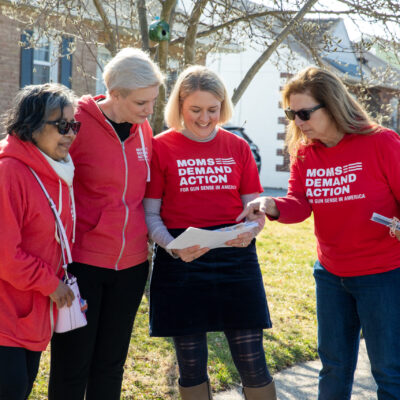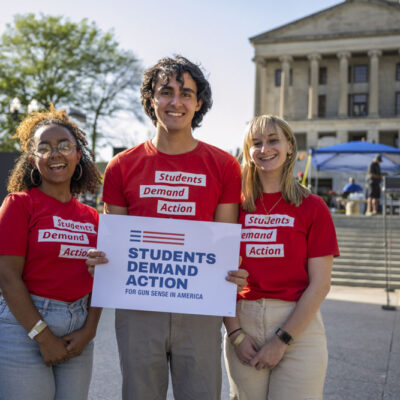What Works Cities, Everytown for Gun Safety Support Fund Partner to Accelerate Learning about Alternative Dispatch in 13 Cities to Improve Emergency Dispatch Systems, Reduce Violence and Save Lives
6.4.2021
Even in Cities With High Homicide Rates, Fewer Than 4 Percent of 911 Calls Are Related to Violent Crime
New Everytown Report Details How Alternative Dispatch Programs Can Reduce Police Shootings and Save Lives
NEW YORK — What Works Cities, a Bloomberg Philanthropies national initiative that helps cities confront urgent challenges through data- and evidence-based decision-making, and Everytown for Gun Safety Support Fund (“Everytown”), the country’s largest gun violence prevention organization, today thanked 13 cities for participating in an eight-week learning initiative to explore alternative dispatch programs designed to improve emergency response, prevent police violence and strengthen public safety and health. Alternative dispatch programs operate by having civilians—such as mental health and social service professionals—respond to select calls for service in cases where they can better address the issue with their specialized training than traditional enforcement or armed officers can alone.
As part of the What Works Cities and Everytown learning initiative, which concluded this week, local government and community leaders from each city took part in a policy “sprint” developed in partnership with the longest running alternative dispatch program in the country, the CAHOOTS program of the White Bird Clinic in Eugene. In addition to sharing experiences from their own cities during virtual weekly convenings, participants learned from other leading experts and practitioners in the field including the Portland Street Response in Portland, OR and the Support Team Assisted Response program (STAR) in Denver, CO.
Participating cities included: Albany, Albuquerque, Austin, Birmingham, Boston, Chicago, Louisville, Phoenix, Saint Paul, San Antonio, Seattle, and Providence (in partnership with Rhode Island).
“Cities are eager to improve emergency response and help keep their residents safe,” said Simone Brody, Executive Director of What Works Cities. “They are looking for a better way, especially knowing that Black residents face heightened safety risks in our current systems. This Sprint is empowering cities to explore alternative dispatch programs as a strategy to improve public safety and health, reduce the perceived need to use force, and to better connect residents with the mental health and social services they need. Our data-driven approach will help cities assess what strategy is best for them.”
“The most effective city leaders are always on the lookout for new ways to keep their communities safe, and alternative dispatch programs show great promise when it comes to saving both lives and money,” said John Feinblatt, president of Everytown. “When people call 911, what they often need most are professionals trained in public health and crisis response, and alternative dispatch programs are making that connection.”
“Over thirty-one years ago White Bird Clinic and the Eugene, OR community launched CAHOOTS behavioral health first response, which diversified public safety programs in alignment with community values. We are pleased to share this successful model that dispatches appropriately trained personnel to meet the varied needs of our residents,” said Chris Hecht, Executive Coordinator, White Bird Clinic.
As detailed in a new report from Everytown, only a small fraction of 911 calls are for serious or violent crimes. Even in communities with high homicide rates such as Baltimore, Camden, Louisiana, New Haven, and New Orleans, fewer than 4 percent of 911 calls are related to violent crimes. Instead, the majority of these calls are for incidents such as disorderly conduct, noise complaints, suspicious people or cars, mental health, substance use, and homelessness. In light of this, improving emergency and crisis response so that professionals better equipped to respond to these challenges are dispatched, is one of a number of measures Everytown has identified that have the potential to help prevent police shootings, which have a disproportionate impact on Black and Latinx communities.
Programs that deploy public health professionals and crisis workers to situations involving mental health, substance use, and homelessness—referred to as alternative dispatch programs—provide an emerging solution that can save lives and provide critical services to those in need.
Crisis Response Helping Out On The Streets (CAHOOTS), which operates out of the White Bird Clinic in Eugene, Oregon is the longest running alternative dispatch program in the country. For over three decades, CAHOOTS has been providing residents of Eugene and nearby Springfield with access to free, trained, civilian first responders for emergency situations involving mental health, substance abuse, and homelessness. Instead of police, a mental health professional and medic are dispatched by the police department’s central 911 system for non-criminal calls for service.
On average, CAHOOTS responders require police assistance in just two percent of calls. This saves the city of Eugene an estimated $8.5 million annually in public safety costs plus an additional $14 million in ambulance trips and emergency response costs. When the cost-saving and treatment benefits became clear to city officials, the program was expanded to include 24/7 coverage in two cities.




